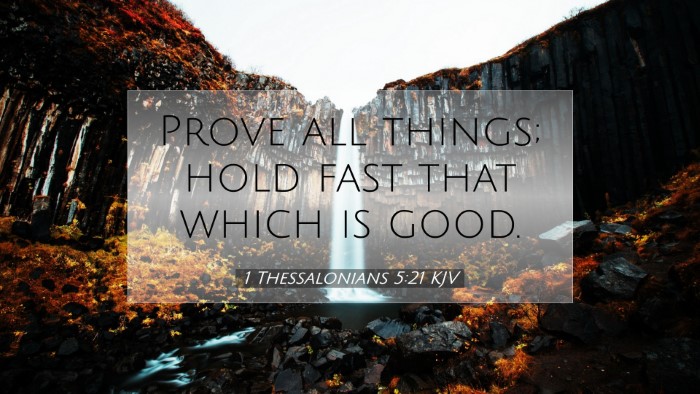Commentary on 1 Thessalonians 5:21
Verse Text: "Prove all things; hold fast that which is good."
Introduction
The exhortation found in 1 Thessalonians 5:21 is a vital instruction that calls for discernment among believers. The Apostle Paul encourages the Thessalonian church—and indeed all believers—to actively evaluate all teachings, practices, and prophecies they encounter in their spiritual journey.
Understanding the Context
This verse comes at the conclusion of a series of practical admonitions that Paul provides to the Thessalonian believers. Following his teaching about the return of Christ and the hope found therein, he offers final instructions that pertain to church life, behavior, and doctrine.
In this specific context, Paul addresses an early church that likely confronted various false teachings and practices. Thus, the call to "prove all things" suggests a necessity for rigorous examination and scrutiny in spiritual matters.
Exploring the Meaning of "Prove All Things"
The term "prove" (or "test") implies a process of examination that seeks to discern truth from error, right from wrong. Paul’s instruction suggests that the responsibility for discernment rests not only with church leaders but also with every individual believer.
Matthew Henry notes that this process of proving involves diligent observation, critical thinking, and a genuine desire to align with God's truth. It is a call to engage thoughtfully with scripture and teachings rather than accepting everything uncritically.
The Importance of Discernment
Discernment is a critical aspect of the Christian faith, particularly in the contemporary context where various ideologies and teachings vie for attention. Albert Barnes emphasizes that discerning what is good is essential for spiritual growth and maturity. Without the practice of discernment, believers may fall prey to misleading doctrines.
Adam Clarke adds that this testing correlates with the empowerment provided by the Holy Spirit, who guides believers into all truth (John 16:13). To "prove all things" is not merely an intellectual exercise; it requires spiritual sensitivity and reliance on divine guidance.
"Hold Fast That Which is Good"
Having tested and proved teachings and practices, Paul instructs believers to "hold fast" to what is good. This phrase implies an active choice to cling to truth and righteousness, allowing it to shape their lives and communities.
Matthew Henry articulates that holding fast requires perseverance and dedication. It’s not enough to determine what is good; believers must commit themselves to it, reinforcing their spiritual foundations amidst challenges.
The Role of Community in Discernment
Discernment is often a communal activity within the church. Paul’s admonition serves as a reminder that while individual testing is necessary, engaging with other believers enhances our understanding of God's truth. The collective wisdom of the church can aid in evaluating teachings and practices more accurately.
Albert Barnes remarks on the importance of fellowship in sharing insights and encouraging one another in the truth. As believers come together, they can reflect on scripture and challenge one another to grow in their understanding and application of God's will.
Conclusion
1 Thessalonians 5:21 serves as a timely reminder for modern Christians to approach their faith with both critical and faithful hearts. As the church navigates a landscape filled with competing ideologies, the call to "prove all things" remains relevant. The process of testing, evaluating, and clinging to what is good is fundamental in fostering maturity and protecting the integrity of the faith.
In conclusion, as believers, we are called not only to acknowledge the truth but to live it out in our lives. This active engagement with God's Word will ensure that we stand firm against the trials and deceptions that may come our way.


